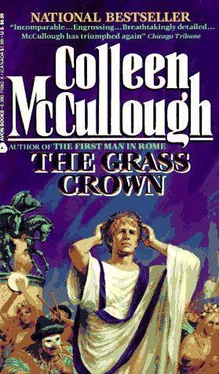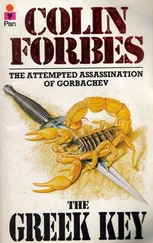Colleen McCullough - 2. The Grass Crown
Здесь есть возможность читать онлайн «Colleen McCullough - 2. The Grass Crown» весь текст электронной книги совершенно бесплатно (целиком полную версию без сокращений). В некоторых случаях можно слушать аудио, скачать через торрент в формате fb2 и присутствует краткое содержание. Жанр: Современная проза. Описание произведения, (предисловие) а так же отзывы посетителей доступны на портале библиотеки ЛибКат.
- Название:2. The Grass Crown
- Автор:
- Жанр:
- Год:неизвестен
- ISBN:нет данных
- Рейтинг книги:5 / 5. Голосов: 1
-
Избранное:Добавить в избранное
- Отзывы:
-
Ваша оценка:
- 100
- 1
- 2
- 3
- 4
- 5
2. The Grass Crown: краткое содержание, описание и аннотация
Предлагаем к чтению аннотацию, описание, краткое содержание или предисловие (зависит от того, что написал сам автор книги «2. The Grass Crown»). Если вы не нашли необходимую информацию о книге — напишите в комментариях, мы постараемся отыскать её.
2. The Grass Crown — читать онлайн бесплатно полную книгу (весь текст) целиком
Ниже представлен текст книги, разбитый по страницам. Система сохранения места последней прочитанной страницы, позволяет с удобством читать онлайн бесплатно книгу «2. The Grass Crown», без необходимости каждый раз заново искать на чём Вы остановились. Поставьте закладку, и сможете в любой момент перейти на страницу, на которой закончили чтение.
Интервал:
Закладка:
And so Gaius Marius rode off, accompanied only by two of his own slaves and a guide furnished by Morsimus, who looked as if he would rather have been traveling with Marius than staying behind. As far as Marius could gather, these inland valley bottoms and the occasional wider uplands he rode across lay at about five and a half thousand feet not quite high enough to cause dizziness and headache, but quite high enough to make staying in the saddle hard work. They still had a long way to go to reach Eusebeia Mazaca, which, his guide told him, was the only urban settlement of any kind within Cappadocia. The sun had gone in the moment he crested the watershed between those rivers which flowed down to Pedian Cilicia and those rivers which contributed to the enormous length and volume of the Halys, and he found himself riding through sleet-showers, fog, and occasional rain. Cold, saddlesore, aching with fatigue, he endured the long hours of jogging along with his legs dangling uselessly, and could only be thankful that the skin of his inner thighs was tough enough not to break down under the constant chafing. On the third day the sun came out again. The ever-widening plains looked a perfect place for sheep and cattle, as they were grassy, relatively free of forests; Cappadocia, his guide told him, did not have the right kind of soil or climate for extensive woodlands, but it grew excellent wheat when the soil was tilled. "Why isn't it tilled, then?" asked Marius. The guide shrugged. "Not enough people. They grow what they need, plus a little to sell along the Halys, where some barges come to buy. But they cannot sell produce in Cilicia, the road is too difficult. And why should they bother? They eat well. They are content." That was almost the only conversation between Marius and his guide while they rode; even when they sought shelter at night within the brown leather tents of nomad shepherds, or within a mud-brick house belonging to some tiny village, they talked little. The mountains marched, now closer, now further away, but never seemed to grow smaller, or less green, or less snowy. And then, when the guide announced that Mazaca was only four hundred stades away (and Marius had translated this into fifty Roman miles), they entered a region so bizarre that Marius wished Julia could see it. The rolling plains persisted, but were broken up by twisting ravines filled with rounded, tapering towers which looked as if they had been carefully shaped out of multicolored clays, a vast toyland built by some demented giant child; in some areas the towers were all topped by huge flat rocks Marius fancied swayed, so precariously were they perched on the skinny necks of these round towers. And wonder of wonders! his eyes began to distinguish windows and doors in some of these unnatural natural structures. "That's why you don't see any more villages," said the guide. "It's cold up here, and the season is short. So the people of this area cut themselves dwellings inside the rock towers. In the summer they are cool. In the winter they are warm. Why should they build houses, when the Great Goddess Ma has already done so?" "How long have they been living inside the rocks?" asked Marius, fascinated. But the guide didn't know. "Since men were," he said vaguely. "At least that long. In Cilicia we say that the very first men came from Cappadocia, and lived then in the same way." They were still riding round these ravines of clay towers when Marius began to notice the mountain; it stood almost alone, the mightiest mountain he had ever seen, higher than Mount Olympus in Greece, higher even than the massifs hedging Italian Gaul around. Its main bulk was cone-shaped, but there were smaller cones on its flanks, and it was solidly white with snow, a brilliant presence against a cloudless sky. He knew which mountain it had to be, of course; Mount Argaeus, described by the Greeks, seen only by a handful of men out of the west. And at its foot, he knew, lay Eusebeia Mazaca, the only city in Cappadocia. The seat of the King. Unfortunately coming from Cilicia meant that Marius approached the mountain from the wrong direction; Mazaca lay on its north side, closest to the Halys, the great red river of central Anatolia, as the Halys represented Mazaca's best contact with the world. Thus it was just after noon when Marius saw the shapes of many buildings clustered together beneath Mount Argaeus, and was in the midst of a sigh of relief when he suddenly realized he was entering a battlefield. The most extraordinary sensation! To ride where men had fought and perished in their thousands not many days before, yet to have neither knowledge of the battle, nor a vested interest in it. For the first time in his life, he, Gaius Marius, the conqueror of Numidia and the Germans, was on a battlefield in the role of a tourist. He itched, he prickled, he burned; but on he rode toward the small city, looking about him no more than he had to. No effort of any kind had been made to tidy things up; bloated corpses denuded of armor and clothing lay decomposing everywhere, only spared flies in plague proportions by the inhospitably icy air, which also cut the stench of necrotic flesh to a bearable level. His guide was weeping, his two slaves were being sick, but Gaius Marius rode on as if he saw nothing untoward, his eyes busy searching for something far more ominous; the camp of a living, victorious army. And it was there, two miles away to the northeast, a huge collection of brown leather tents beneath a thin blue pall of smoke from many fires. Mithridates. It could be no one else. And Gaius Marius did not make the mistake of thinking that the army of dead men belonged to Mithridates. No, his was the living, victorious army; the field Marius rode across was strewn with Cappadocians. Poor rock-dwellers, nomad shepherds and probably, he told himself, his practical streak reviving, the bodies of many Syrian and Greek mercenaries as well. Where was the little King? No need to ask. He hadn't come to Tarsus and he hadn't answered any of the couriered letters because he was dead. So too, no doubt, were the couriers. Perhaps another man would have turned his horse around and ridden away hoping his approach hadn't been detected; but not Gaius Marius. He had run King Mithridates Eupator to earth at last, though not on his own earth. And he actually kicked his tired mount in its trembling sides, urging it on to the meeting. When he realized that no one was watching that no one had remarked his progress that no one noticed him even when he rode through the main gate into the town, Gaius Marius was amazed. How secure the King of Pontus must feel! Pulling his sweating beast to a halt, he scanned the rising tiers of streets in search of an acropolis or citadel of some kind, and saw what he presumed to be the palace lying on the mountain flank at the rear of the city. It was evidently built of some soft or lightweight stone not fit to take the brunt of the local winter winds, for it had been plastered, and painted then in a rich deep blue, with red columns blazing, and Ionic capitals of a deeper red picked out in a glittering gold. There! thought Marius. He'll be there! He turned his horse up one of the sloping narrow streets, navigating his way by sight to the palace, which was hedged around by a blue-painted wall, and lay within chilly bare gardens. Spring comes late to Cappadocia, he thought, and regretted that it would never come at all for young King Ariarathes. The people of Mazaca had apparently gone into hiding, for the streets were utterly deserted, and when he arrived at the gate opening into the palace precinct, Marius found it unguarded. How secure indeed, King Mithridates! He left his horse and attendants at the foot of the flight of steps leading up to the main door, a double affair in chased bronze adorned with reliefs depicting, in dauntingly graphic detail, the rape of Persephone by Hades; Marius had plenty of time to absorb these repellent antics as he stood there waiting for someone to answer his thunderous knock. Finally the door creaked, groaned, and one leaf came hesitantly open. "Yes, yes, I heard you! What do you want?" asked an old, old man, in Greek. Somewhere inside Marius a dreadful urge to laugh was growing, very difficult to suppress, so when he spoke, his voice was shaky, squeaky, unimpressive. "I am Gaius Marius, consul of Rome. Is King Mithridates about?" he asked. "No," said the old, old man. "Are you expecting him?" "Before dark, yes." "Good!" Marius pushed the door open and stepped into the vastness of what was obviously a throne room or main reception room, beckoning his three attendants to follow. "I need accommodation for myself and these three men. Our horses are outside and should be stabled. For myself, a hot bath. At once."
Читать дальшеИнтервал:
Закладка:
Похожие книги на «2. The Grass Crown»
Представляем Вашему вниманию похожие книги на «2. The Grass Crown» списком для выбора. Мы отобрали схожую по названию и смыслу литературу в надежде предоставить читателям больше вариантов отыскать новые, интересные, ещё непрочитанные произведения.
Обсуждение, отзывы о книге «2. The Grass Crown» и просто собственные мнения читателей. Оставьте ваши комментарии, напишите, что Вы думаете о произведении, его смысле или главных героях. Укажите что конкретно понравилось, а что нет, и почему Вы так считаете.












